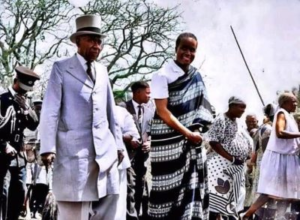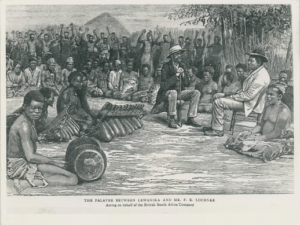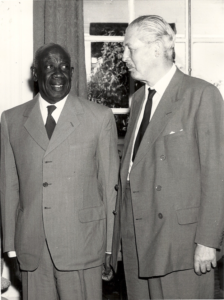BNFA—March 27, 2012 Emancipation Day Statement
by Mukwae Wabei Siyolwe, Chairperson General
Kuwabile Kweli ya Liatamani BNC 2012
March 27, 2020
Barotse National Council (BNC) 2012
Emancipation Day National Holiday
 On March 27, 2012 Barotseland spoke in one voice for our collective survival. We as a traditional African nation accepted the abrogation of the Barotseland Agreement 1964 by the Zambian government and chose to walk hand-in-hand towards self-determination. The killing of Barotse activists on January 14, 2011 by Zambia forces under President Rupiah Banda was the tipping point that sparked the Barotse National Council of March 27, 2012. The BNC passed Resolutions ensuring justice for our people after fifty years of exhausting every legal avenue and putting pressure on successive, repressive Zambian regimes to honor the Barotseland Agreement 1964.
On March 27, 2012 Barotseland spoke in one voice for our collective survival. We as a traditional African nation accepted the abrogation of the Barotseland Agreement 1964 by the Zambian government and chose to walk hand-in-hand towards self-determination. The killing of Barotse activists on January 14, 2011 by Zambia forces under President Rupiah Banda was the tipping point that sparked the Barotse National Council of March 27, 2012. The BNC passed Resolutions ensuring justice for our people after fifty years of exhausting every legal avenue and putting pressure on successive, repressive Zambian regimes to honor the Barotseland Agreement 1964.
The Barotse National Freedom Alliance (BNFA) started as an umbrella organization of all activists’ groups (Linyungandambo, Barotse Freedom Movement, Movement for the Restoration of Barotseland, Barotse Imilemas, Barotse Youth league and others), for the purpose of implementing the sovereign resolutions of March 2012 Barotse National Council in a peaceful manner and protect the fundamental human rights of the peoples of Barotseland. On July 8, 2016, BNFA transformed itself into a mass organization.
Thus far, we have made the following giant steps to actualize our legitimate right to self-determination:
- Barotseland was admitted as a member of the Unrepresented Nations and Peoples Organization (UNPO) on 23 November, 2013 and classified as an occupied territory through the BNFA.
- BNFA gave late President Sata two months to sign the PCA arbitration agreement it had proposed with Paris based lawyers Lazareff Le Bars and Geneva based Aceris Law in order to allow the peaceful resolution of the Barotseland issue in accordance with international law. That deadline passed on 28 May, 2014
- On 26 January and 11 June, 2015, BNFA challenged President Edgar Lungu to sign the Permanent Court of Arbitration Submission Agreement https://barotselandpost.com/top-stories/bnfa-challenges-lungu-to-sign-the-pca-submission-agreement
- On 18 August, 2015 Hon. Clement Sinyinda, the former Chairperson General of BNFA, filed Communication 429/12 the Ngambela of Barotseland and Others vs. The Republic of Zambia with the African Union Commission on Human & People’s Rights in Banjul, The Gambia.
- BNFA acquired over 8000 signatures by 29 December 2015 for the immediate abdication of Litunga EdwinLubosi Imwiko.
- By July 8, 2016, BNFA had transformed itself into a mass organization with over 10,000 signatures for the PCA
- On October 31, 2016 BNFA filed a complaint to the Office of the United Nations High Commissioner for Human Rights, United Nations, Geneva.
- BNFA representive makes live recommendations on 10th October 2017 during the 28th pre-session on the occasion of the Universal Periodic Review (UPR), reporting to the world body at the United Nations on the human rights abuse of the Republic of Zambia.
- February 20, 2020 BNFA accepts the resignation of Hin. Clement Sinyinda
- March 9, 2020 BNFA appoints Diaspora Executive Chair (DEC) Mukwae Wabei Siyolwe as Chair of BNFA.
On this momentous day of remembrance and emancipation, let us go back to other moments in our cultural memory where we exercised this basic human rights through the Barotse National Councils that changed the course of our collective history.
 Mulena Yomuhulu Lewanika Lubosi Litia (1842-1916), brought Barotseland under British protection through the Lochner Treaty. Although Lewanika sought protection of Great Britain, he called for a National Council in 1890 before signing the Lochner Concession in June 1890, which assigned mineral and trading rights of Barotseland to the British South Africa Company (BSAC). He believed he was signing an agreement with the British government and would spend the rest of his life petitioning the UK government to rescind the agreement.
Mulena Yomuhulu Lewanika Lubosi Litia (1842-1916), brought Barotseland under British protection through the Lochner Treaty. Although Lewanika sought protection of Great Britain, he called for a National Council in 1890 before signing the Lochner Concession in June 1890, which assigned mineral and trading rights of Barotseland to the British South Africa Company (BSAC). He believed he was signing an agreement with the British government and would spend the rest of his life petitioning the UK government to rescind the agreement.
 Mulena Yomuhulu Mwanawina III Lewanika (1888-1968), King of Barotseland was bestowed with the title of the Knight Commander of the British Empire (KBE), on 1st January, 1959. In 1964 the Barotse Legislative Council sanctioned King Mwanawina III to sign the Barotseland Agreement 1964. On 18 May 1964, King Mwanawina III, Kenneth Kaunda Prime Minister of Northern Rhodesia and Duncan Sandys, Principle Secretary of the United Kingdom signed the Barotseland Agreement 1964, which established Barotseland as an autonomous territory within Zambia. The Agreement replaced the earlier agreements between Barotseland and the British Government. The agreement was based on a long history of close social, economic and political interactions. The Barotseland Agreement granted Barotse authorities local self-governance rights and rights on specified matters, including over land, natural resources and local government. It also established the Litunga of Barotseland acting after consultation with his Council as "the principal local authority for the government and administration of Barotseland, that he would remain in control of the "Barotse Native Government", the "Barotse Native Authorities", the courts known as the "Barotse Native Courts", "matters relating to local government", "land", "forests", "fishing", "control of hunting", "game preservation", the "Barotse native treasury", the supply of beer and "local taxation". There was also to be no appeal from Barotseland's courts to the courts of Zambia on land matters.
Mulena Yomuhulu Mwanawina III Lewanika (1888-1968), King of Barotseland was bestowed with the title of the Knight Commander of the British Empire (KBE), on 1st January, 1959. In 1964 the Barotse Legislative Council sanctioned King Mwanawina III to sign the Barotseland Agreement 1964. On 18 May 1964, King Mwanawina III, Kenneth Kaunda Prime Minister of Northern Rhodesia and Duncan Sandys, Principle Secretary of the United Kingdom signed the Barotseland Agreement 1964, which established Barotseland as an autonomous territory within Zambia. The Agreement replaced the earlier agreements between Barotseland and the British Government. The agreement was based on a long history of close social, economic and political interactions. The Barotseland Agreement granted Barotse authorities local self-governance rights and rights on specified matters, including over land, natural resources and local government. It also established the Litunga of Barotseland acting after consultation with his Council as "the principal local authority for the government and administration of Barotseland, that he would remain in control of the "Barotse Native Government", the "Barotse Native Authorities", the courts known as the "Barotse Native Courts", "matters relating to local government", "land", "forests", "fishing", "control of hunting", "game preservation", the "Barotse native treasury", the supply of beer and "local taxation". There was also to be no appeal from Barotseland's courts to the courts of Zambia on land matters.
Within a year of taking office as president of the newly-independent Zambia on, President Kenneth Kaunda began to introduce various acts that abrogated the powers allotted to Barotseland under the agreement .Notably, the Local Government Act of 1965 abolished the traditional institutions that had governed Barotseland and brought the kingdom under the administration of the government of Zambia. In 1969, the Zambian Parliament passed the Constitutional Amendment Act, annulling the Barotseland Agreement of 1964. Later that year the government changed Barotseland’s name to Western Province and announced that all provinces would be treated "equally". The agreement’s dissolution and the stubbornness of successive governments in ignoring repeated calls to restore it have fuelled the region’s ongoing tension. One of the reasons why Kenneth Kaunda "revoked" the United Kingdom's Zambia Independence Act is reported to be that it called for the continuation of Barotseland.
Here we are today eight years on remembering March 27, 2012 our day of emancipation, when we decided after over fifty years of discrimination, poverty, humiliation, disease, neglect, imprisonments, death, resolved to overcome any differences we have as a people to continue to be a nation of cultural citizens whose identity transcends artificial borders and constructed nation and colonial states for the benefit of generations to come.
Barotseland, Ba-ntu
United in blood
Under one sun.
Shangwe
https://youtu.be/9FzrbwvM7jU
 On March 27, 2012 Barotseland spoke in one voice for our collective survival. We as a traditional African nation accepted the abrogation of the Barotseland Agreement 1964 by the Zambian government and chose to walk hand-in-hand towards self-determination. The killing of Barotse activists on January 14, 2011 by Zambia forces under President Rupiah Banda was the tipping point that sparked the Barotse National Council of March 27, 2012. The BNC passed Resolutions ensuring justice for our people after fifty years of exhausting every legal avenue and putting pressure on successive, repressive Zambian regimes to honor the Barotseland Agreement 1964.
On March 27, 2012 Barotseland spoke in one voice for our collective survival. We as a traditional African nation accepted the abrogation of the Barotseland Agreement 1964 by the Zambian government and chose to walk hand-in-hand towards self-determination. The killing of Barotse activists on January 14, 2011 by Zambia forces under President Rupiah Banda was the tipping point that sparked the Barotse National Council of March 27, 2012. The BNC passed Resolutions ensuring justice for our people after fifty years of exhausting every legal avenue and putting pressure on successive, repressive Zambian regimes to honor the Barotseland Agreement 1964.
